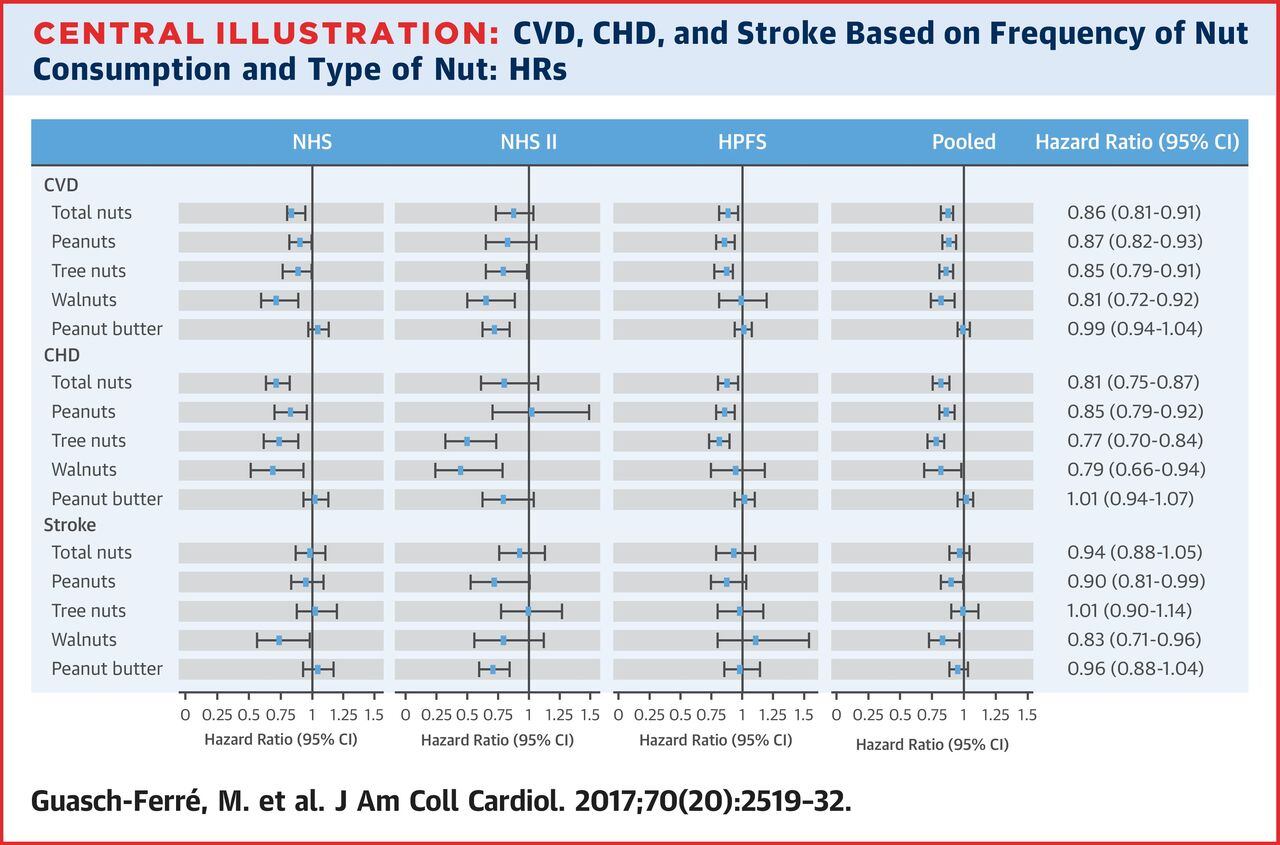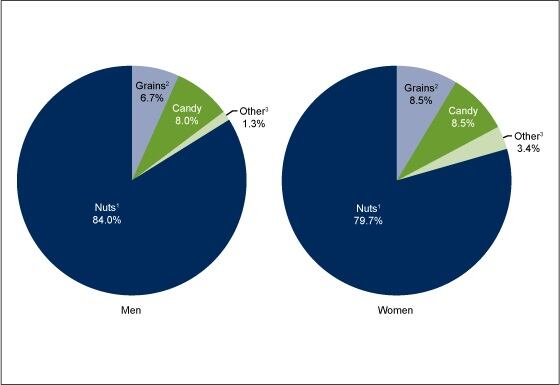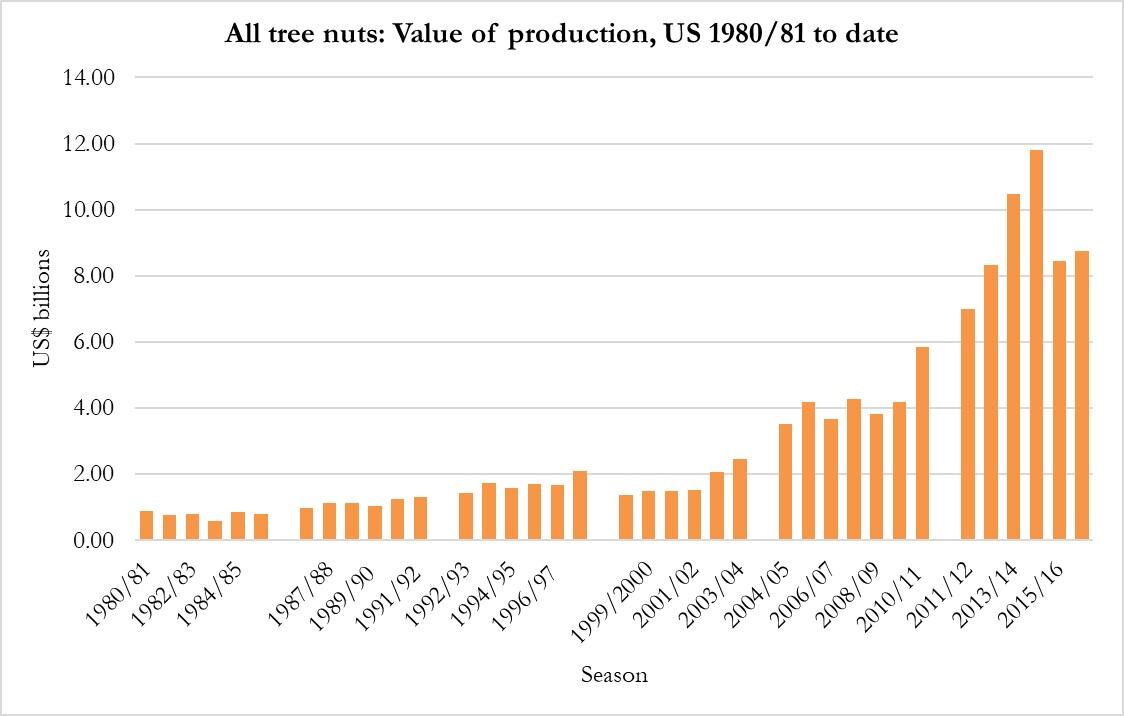Data from over 210,000 people showed that five or more servings of nuts a week were associated with a 14% lower risk of cardiovascular disease (CVD) and a 20% lower risk of coronary heart disease (CHD), compared to no or nearly no nut consumption.
The study, published in the Journal of the American College of Cardiology, adds to the ever growing body of science supporting the health benefits of nuts, and breaks down the potential benefits between specific types of nuts – tree nuts, walnuts, peanuts, and peanut butter – with major cardiovascular events. The authors noted that peanuts were included because they have a similar fatty acid and nutrient profile as other nuts.
“Our findings support recommendations of increasing the intake of a variety of nuts, as part of healthy dietary patterns, to reduce the risk of chronic disease in the general populations,” said Marta Guasch-Ferré, PhD, lead author of the study and research fellow at the department of nutrition at Harvard T.H. Chan School of Public Health.
Study details
Dr Guasch-Ferré and her co-workers pooled data from the Nurses’ Health Study, the Nurses’ Health Study II, and the Health Professionals Follow-Up Study. Nut consumption was assessed using food frequency questionnaires at the start of each study and updated every four years.
In total, 14,136 cardiovascular disease cases, including 8,390 coronary heart disease cases and 5,910 stroke cases were documented.
After crunching the numbers, the researchers found that eating walnuts one or more times per week was associated with a 19% lower risk of cardiovascular disease and 21% lower risk of coronary heart disease.
In addition, participants who ate peanuts or tree nuts two or more times per week had a 13% and 15% lower risk of cardiovascular disease, respectively, and a 15% and 23%, lower risk of coronary heart disease, respectively, compared to those who never consumed nuts (see figure below).
On the other hand, no links were observed for stroke and the consumption of all nuts, or peanut butter or tree nuts, said the researchers. However, a protective effect against stroke was observed for peanut and walnut consumption.

Heart-protective diets

In an accompanying editorial comment, Emilio Ros, MD, PHD, of the Endocrinology and Nutrition service at the Hospital Clínic in Barcelona and investigator of CIBEROBN, a research network of Instituto de Salud Carlos III, Spain, confirmed that the consistency of the findings strongly suggests an association between nut consumption and heart disease protection, but there is more to research.
“Ideally, further investigations should test the effects of long-term consumption of nuts supplemented into the usual diet on hard cardiometabolic events,” Ros said. “In the meantime, raw nuts, if possible unpeeled and otherwise unprocessed, may be considered as natural health capsules that can be easily incorporated into any heart-protective diet to further cardiovascular well-being and promote healthy aging.”
Nut consumption
Nut production (see below) and consumption in the US has been on the increase over the years. According to the US Centers for Disease Control and Prevention (CDC), almost four in every 10 US adults consumed nuts on a given day in 2009–2010.
The FDA approved a qualified health claim in 2003 that stated: “scientific evidence suggests, but does not prove, that eating 1.5 ounces per day of most nuts as part of a diet low in saturated fat and cholesterol may reduce the risk of heart disease.”

Source: Journal of the American College of Cardiology
November 2017, Volume 70, Issue 20, doi: 10.1016/j.jacc.2017.09.035
“Nut Consumption and Risk of Cardiovascular Disease”
Authors: M. Guasch-Ferré et al.
Editorial: Journal of the American College of Cardiology
November 2017, Volume 70, Issue 20, doi: 10.1016/j.jacc.2017.09.1082
“Eat Nuts, Live Longer”
Author: E. Ros

